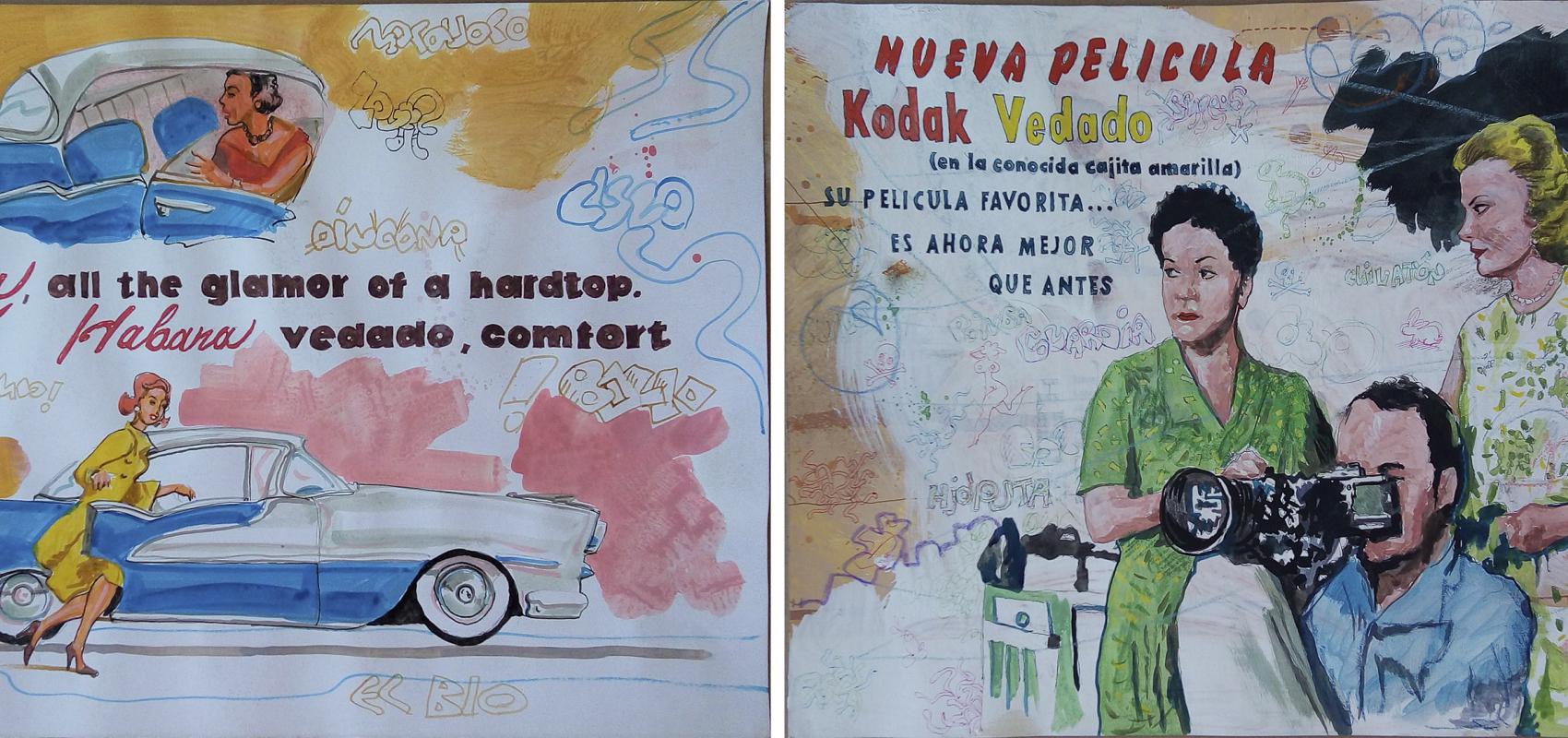Well-dressed and exotic women, colors in their maximum expression, a world of fantasy presents Douglas Perez Castro with his series Vedado, some pieces belonging to the Máxima Estudio-Taller collection.
As a world of fantasies, in the end, it contains an emotional charge to reflect on the past and its setbacks. We are the result of the events that preceded us, both personally and as a country. The principle applies to any nation or individual.
The cars of the time, wives waiting for their spouses at home, the productive process in the factories, along with fashionable cigar brands and cozy houses, among other images, are the scenery chosen by Pérez Castro to place us in the Vedado of the 1950s where life, apparently, was easier and lighter.
Behind the apparent glamour there is evidence of the real Cuba, without masks, where in the streets you can find messages of bad taste that alter and frighten at the same time, as evidence of the loss of values in society. This is the Vedado that Douglas Pérez Castro shows, with its lights and shadows, just as Cubans are.
In reality, what is the artist's intention? His intention is to reveal the "values that enhance the strength of an expansive capitalism based on the paths of the cold war and the exercise of an economy and democracies based on the concentration of capital in banks and in the most experienced machinery for the production of existing goods", explains the painter to Maxima.
As everything in life has its opposite side, the creator shows the counterpart of those analyses, "a totalitarian communist bloc that is firmly committed to showing its practical and antagonistic ideology: 'socialism is the superior and final phase of capitalism' and that sports a deliberate desire to compete for the success of a social model of collective and egalitarian scope to achieve true happiness," says Douglas. He adds: "My series attempts to recreate this 'doublethink' in which the anguished physical loneliness of the individual, unresolved by either of the two socio-political systems, is debated.
In the face of the situations described, in the face of duality and confusion, the artist bets on an awakening of conscience from the magnetism of art, from judgments capable of reaching the same conclusions through rigorous observation. Pérez Castro has known how to play his cards well with the Vedado series and presents us, at times, with faces that sigh, an apparent happiness that can be mistaken for the real thing.
The years of the Republic have the flavor of the political and although there are thorough investigations on the period, what the Cuban people know most and have engraved in their minds are the puppet governments, corrupt and military coups of Fulgencio Batista. In such a way that the wealth and domestic welfare that also distinguished the period are ignored. This is also how Pérez Castro understands it: "the improvement of the individual's living conditions through comfort and prosperity with one's own work, confronted with the idea of achieving them through social and armed revolution". "Nevertheless, it is necessary to emphasize the contrast that really arises at the end of the decade, with an anti-consumerist mentality and to put an end to the material inequalities and of opportunities among Cubans, which would try to destroy in the ideological field everything that at that time had represented the wild capitalism" expresses the author of the series.
Due to the socioeconomic characteristics of Cuba, Douglas considers, even more profound "the impact that this memory has in societies of Third World mentality, so susceptible to be easily distorted, playing art also its role of resilience in all this; exalting dissimilar contradictions born of the imitation of a model that is constantly denied".
In the beginning, El Vedado was thought of as an area of ample economic development, where a good part of the Havana bourgeoisie built houses, factories and large urban spaces that show the prosperity lived in its streets and homes. Now, in the 21st century, the panorama has changed, the creator assures: "it struggles in the ruinous condition of not being able to adapt to the new expectations of this social process that ignores and rejects all the meaning for which it was conceived and developed in its beginnings. This is the inspirational prop of the series".
Life passes and man adapts to the reality of his eyes. However, in his psyche persists the idea of magnificent and luxurious years in Vedado and Douglas Perez Castro is in charge of reminding us of it in the most elegant way possible: with art.
31/08/2020





